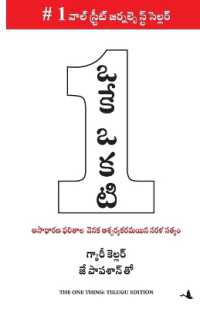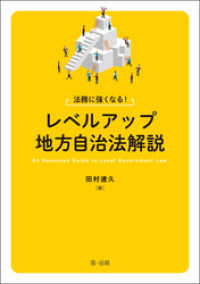- ホーム
- > 洋書
- > 英文書
- > Religion / Ethics
基本説明
Through analysis of diverse cases throughout history, Richard Landes demonstrates that millenialism has been deliverately downplayed and even ignored by historians, and shows that millenarian beliefs have played a role in many supposedly secular events, movements, and periods, including modernity.
Full Description
Millennialists through the ages have looked forward to the apocalyptic moment that will radically transform society into heaven on earth. They have delivered withering critiques of their own civilizations and promised both the impending annihilation to the forces of evil and the advent of a perfect society. And all their promises have invariably failed. We tend, therefore, to dismiss these prophets of doom and salvation as crackpots and madmen, and not surprisingly historians of our secular era have tended to underestimate their impact on our modern world. Now, Richard Landes offers a lucid and ground-breaking analysis of this widely misunderstood phenomenon.
This long-awaited study shows that many events typically regarded as secular--including the French Revolution, Marxism, Bolshevism, Nazism--not only contain key millennialist elements, but follow the apocalyptic curve of enthusiastic launch, disappointment and re-entry into "normal time." Indeed, as Landes examines the explicit millennialism behind such recent events as the emergence of Global Jihad since 1979, he challenges the common notion that modern history is largely motivated by secular interests. By focusing on ten widely different case studies, none of which come from Judaism or Christianity, he shows that millennialism is not only a cultural universal, but also an extremely adaptive social phenomenon that persists across the modern and post-modern divides. At the same time, he also offers valuable insight into the social and psychological factors that drive such beliefs.
Ranging from ancient Egypt to modern-day UFO cults and global Jihad, Heaven on Earth both delivers an eye-opening revisionist argument for the significance of millennialism throughout history and alerts the reader to the alarming spread of these ideologies in our world today.
Contents
Preface ; Part I: Introduction: Roosters, Owls, Bats ; 1. The Varieties of the Millennial Experience ; 2. Roosters and Owls: On the Dynamics of the Apocalyptic Curve ; 3. Bats and Turkeys: Historians and Recovering of the Millennial Past ; Part II: Tribal Millennialism ; 4. Suicidal Millennialism: Xhosa Cattle Slaying (1856-7) ; 5. Commodity Millennialism: Papuan Cargo Cults (20th century) ; Part III: Agrarian Millennialism ; 6. Imperial Millennialism: Akhenaten (1360-47 BCE) ; 7. Murderous Millennialism: Taiping (1850-64 CE) ; Part IV: Modern (Secular) Millennialism ; 8. Civil Polities and the Dismantling of the Prime Divider ; 9. Democratic Millennialism: French Revolution (1789-1815) ; 10. Egalitarian Millennialism: Marxism (19th century) ; 11. Totalitarian Millennialism: Soviet Revolution (1917-35) ; 12. Genocidal Millennialism: Nazis (1933-45) ; Part V: Post-Modern Millennialism ; 13. Narcissistic Millennialism: UFOs (1946-) ; 14. Enraged Millennialism: Global Jihad (1979-) ; Conclusion: The Suicide of Reason at the Dawn of the Third Millennium?








